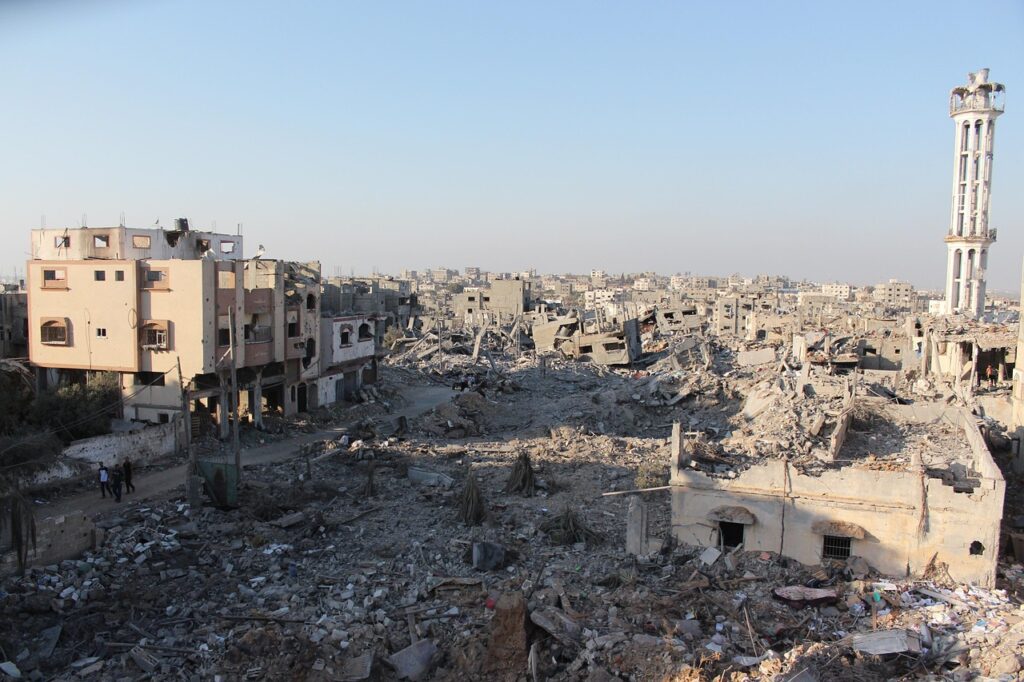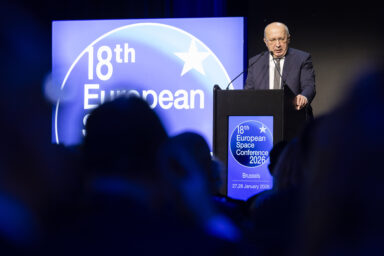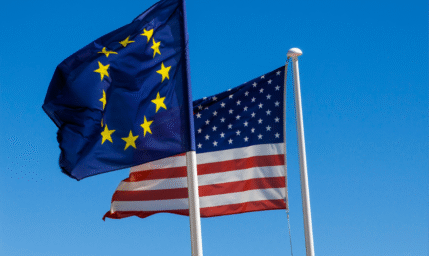Even in the usually quieter summer months, EU diplomacy has been anything but idle. At its midday press briefing on Tuesday, the European Commission fielded a wave of questions, with attention split between the worsening humanitarian crisis in Gaza and mounting concern over Friday’s US–Russia summit in Alaska. While the Commission’s initial remarks were cautious, the day closed on a more urgent note: a joint declaration by 25 foreign ministers and EU officials — including Kaja Kallas — urging Israel to allow a “flood” of humanitarian aid into Gaza, talking explicitly about “starvation”.
Commission spokespeople Arianna Podestà and Anitta Hipper reiterated the bloc’s firm support for Ukraine (following a strong joint statement by 26 of 27 EU members on Tuesday morning). The spokespersons declined to entertain any speculation about what could happen, namely whether any contingency plan was being considered, should the Alaska talks go worse than expected – or result in unfavourable terms for Kyiv.
Foreign Policy spokesperson Anitta Hipper referenced the extraordinary Foreign Affairs Council meeting a day earlier led by the EU’s High Representative for Foreign Affairs Kaja Kallas and reiterated its findings, saying the meeting had tackled the importance of giving Ukraine “all that it needed in view of the upcoming negotiations.” Arianna Podestà added:
“Yesterday there was discussion among the ministers of foreign affairs. There are contacts ongoing with their Ukrainian counterparts at all times – and at all stages. The meetings of tomorrow convened by Chancellor Merz include President Zelenskyy so contact with him and his administration are constant.”
You might be interested
Questions of whether Mr Zelenskyy himself would be invited to a follow-up leaders’ summit was something that Arianna Podestà said was “not her place to speculate.”
All for one – one for all, almost
Early on Tuesday, following yesterday’s extraordinary meeting, the EU issued a joint declaration of support for Ukraine’s sovereignty and territorial integrity — endorsed by 26 of 27 member states, with Hungary abstaining. The statement represents strong support for Ukraine following worrying remarks earlier from US President Donald Trump, namely possible land swaps, which had stirred unease across Europe.
I’ll know within the first two minutes whether or not a deal can be made. – US President Donald Trump
On Tuesday, spokespersons were careful to avoid hypotheticals, emphasising instead the bloc’s long-standing position and commitment to supporting Ukraine through political, military, and financial channels. At the same time, there is growing anticipation over a planned virtual meeting on Wednesday between European leaders, Mr Zelenskyy and Mr Trump, as a last chance to bend the US president’s ear before the summit, where EU representatives and President Zelenskyy himself will be notably absent.
Almost uncharacteristically, even Mr Trump has downplayed the Alaska summit as a ‘feel-out’ meeting. The Washington Post and other sources reported him as saying he would know “within the first two minutes whether or not a deal can be made.” The US president contended he needed to see for himself if a deal can be reached.
Could Wednesday’s virtual meeting prove pivotal?
There is no doubt that participants will most want to get their message across to Mr Trump, that Europe stands with Ukraine. As well, that any undermining of that commitment would not lead to a just or lasting peace. Just as important is Europe’s future defence and security as a whole. No doubt also of importance will be factors such as the commitment by the EU to buy American arms as well as business commitments between Ukraine and the US.
That meeting on Wednesday will be followed by a gathering of the Coalition of the Willing. The aim there will be to repeat and reinforce a commitment to Ukraine remaining capable of defending itself.
Famine is unfolding before our eyes. Urgent action is needed now to halt and reverse starvation. – Foreign Ministers’ statement
Humanitarian aid in Gaza not nearly enough
Humanitarian concerns in Gaza also featured prominently at Tuesday’s briefing. Commission representatives acknowledged that while some aid has been allowed in, the current level of access remained far below what is needed. They emphasised concern over the matter and stressed that humanitarian deliveries needed to rapidly scale up. Anitta Hipper was asked whether the EU was raising pressure on Israel to get more aid in.
“Regarding what was discussed, there was an absolute consensus on the need of urgency, on the importance of getting humanitarian aid to the Gaza Strip, but also in terms of the need to secure that international NGOs that are facing administrative obstacles are let in and fully allowed. The same [urgency is there] when it comes to humanitarian airdrops which are only a temporary solution as well as the ceasefire needed to secure the release of the hostages. Negotiating the two-state solution is also an important point.”
She added that the issue of progress had also been discussed, and noted the role played thus far by the High Representative’s efforts with Israeli authorities. She made clear the EC was pushing for Israel to follow up without further delay, capping what she called the overall “atmospherics and diplomatic outreach.”

Matters reach a tipping point
In fact, it didn’t take long for reaction to escalate much more quickly, with 25 foreign ministers as well as EU representatives, including Kaja Kallas, signing a joint-statement calling for a ‘flood’ of aid to be allowed into Gaza. The statement was revealed on Tuesday afternoon.
On X, the EU’s High Representative wrote that Israel’s new restrictions on NGOs would “worsen an already catastrophic situation.” She also linked readers to the full statement agreeing that “The humanitarian suffering in Gaza has reached unimaginable levels. Famine is unfolding before our eyes. Urgent action is needed now to halt and reverse starvation.” Elsewhere in the document, signatories thanked partners including Qatar, Egypt and the US in pushing for a ceasefire and pursuing peace.
Critical days ahead
Ukraine and Gaza remain among the EU’s most urgent and complex foreign policy challenges — and this week’s summit and other meetings could prove pivotal. While efforts around Ukraine are focused on coordination ahead of Friday’s talks, pressure over the suffering in Gaza is rising fast — and turning into outrage. Clear and quick solutions may remain difficult to reach, but frustration is growing among everyone from officials to local observers as they witness ongoing suffering with no resolution in sight.











